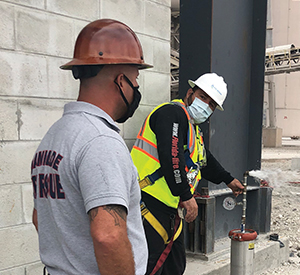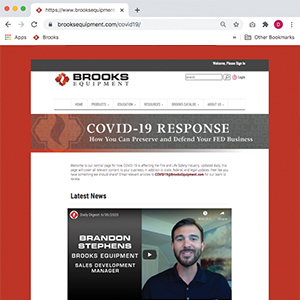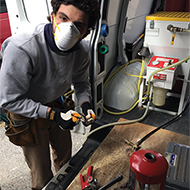The COVID-19 pandemic arrived in the United States in January, and by March there were cases in all 50 states. That is when things started to change for our industry. On Thursday, March 19, Brooks received word that businesses in many states were being
categorized as either nonessential or essential. What was hard to comprehend was the possibility that technicians that install and maintain fire and life safety systems and equipment might be categorized as nonessential. The
Brooks team immediately began to network with trade associations, like FEMA, NASFM, NAFED, FSSA, and others. What happened by the end of the following week is pretty amazing and helped establish that fire and life safety businesses
are essential and can continue to enter properties and maintain the critical systems and equipment that building occupants rely on to remain safe from fire and other hazards.

Fire Marshals
With the encouragement of Brooks, the Fire Equipment Manufacturers Association (FEMA) sent a letter on March 20 to the fire marshals in all 50 states, urging them to advocate for the inclusion of all professions that engage in maintaining fire and life
safety equipment (and their supply chain) as essential businesses. The letter went on to say “… that those who maintain fire and life safety equipment should be deemed essential and life sustaining. This would include, but not
be limited to, portable fire extinguishers, interior equipment, fire hose, pre-engineered suppression systems, fire alarms, and water-based fire sprinklers.”
NFPA
Brooks contacted NFPA to suggest that they issue a letter or bulletin stating that fire and life safety businesses are essential and should remain operational. On March 24, NFPA issued a guidance document that urged officials to ensure that fire protection
and life safety systems be maintained in all commercial and multi-occupancy residential buildings throughout the global pandemic. NFPA further urged that the personnel and vendors that service those systems be deemed essential.
Homeland Security
What became clear was that many states were issuing orders that only businesses that were designated as “essential” were allowed to remain operational. The state orders were very similar or identical in their wording. The reason was that they were copying
a federal document, issued by the Cybersecurity and Infrastructure Security Agency (CISA), which is part of the US Dept of Homeland Security. That document is titled Guidance on the Essential Critical Infrastructure Workforce: Ensuring
Community and National Resilience in COVID-19 Response. Probably due in part to FEMA and FSSA having sent letters to CISA urging them to clarify their guidance, regarding fire and life safety businesses, CISA issued an update. On March
28, CISA posted a revised version (2.0) that includes workers providing electronic security, fire, monitoring and life safety services as being essential critical infrastructure workers. In the advisory, CISA stated the following:
The CISA advisory went on to say “Promoting the ability of such workers to continue to work…is crucial to community resilience and continuity of essential functions”.
FEDs are Essential Businesses
The combination of the FEMA letter to the fire marshals, the NFPA guidance document, and the CISA advisory update provided the impetus for our industry to continue to provide the services to their customers to maintain vital fire and life safety systems
and equipment. Following these accomplishments, it was time to get the word out.
Brooks Creates a Webpage Devoted to COVID-19
It became clear, early-on, that there was a need to keep FEDs informed on the rapidly changing regulatory world of fire protection, as it was being impacted by the COVID-19 pandemic in the US. Since FEDs look to Brooks as a resource for information, we
decided to create a COVID-19 webpage where our customers could get the latest accurate information on the changes being driven by the COVID-19 pandemic. But rather than just post general-type information, our team sorted out the information
that is specifically applicable to the needs of the FED. Our webpage contains federal, state, and local information and includes informative articles, webinars, and videos specially developed for FEDs. With the rapidly changing regulations
and state orders and directives, the page is updated continuously. We believe we have the most comprehensive page, customized to your interests on this topic.

Paycheck Protection Program for FEDs
The Paycheck Protection Program (PPP) is a loan program administered by the Small Business Administration (SBA), intended to provide money for small businesses (like FEDs) for payroll, rent, and utilities. For weeks, the Brooks webpage continuously updated
documents, forms, articles, applications, instructions, and webinars to assist FEDs in getting the PPP loan. As a followup, we developed a video webinar on the steps to take, to apply, and get forgiveness for the PPP loan, which means
most FEDs did not have to repay their loans.

PPP Updated
Congress recently passed an update to PPP, which extends the application deadline to August 8, 2020. FEDs will now have 6 months, or until the end of the year, to spend the PPP loan money for approved purposes and be forgiven for the loan. Also the split
is 60% for payroll and 40% for rent and utilities, rather than the previous 75/25 split. All of these changes are favorable to you.
New Federal Loan Program
The Main Street Lending Program (MSLP) is another federal loan program that was recently launched as part of the CARES Act. It is intended for small- and medium-size businesses. There is a detailed webinar on the MSLP, developed specifically for FEDs,
which is available for viewing on our COVID-19 webpage.
We believe in the importance of the work you do to keep people safe and buildings code compliant.
Brooks took early action to establish that FEDs are essential businesses, which helps support you in your efforts to keep your customers safe. And we continue to monitor changes at the federal and state levels. We believe in the importance
of the work you do to keep people safe and buildings code compliant. We will continue to do our best to support you as the COVID crisis continues in the coming months.